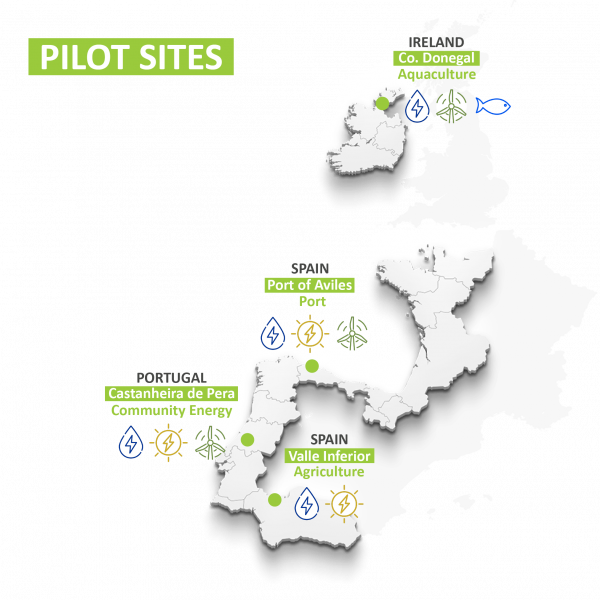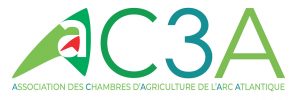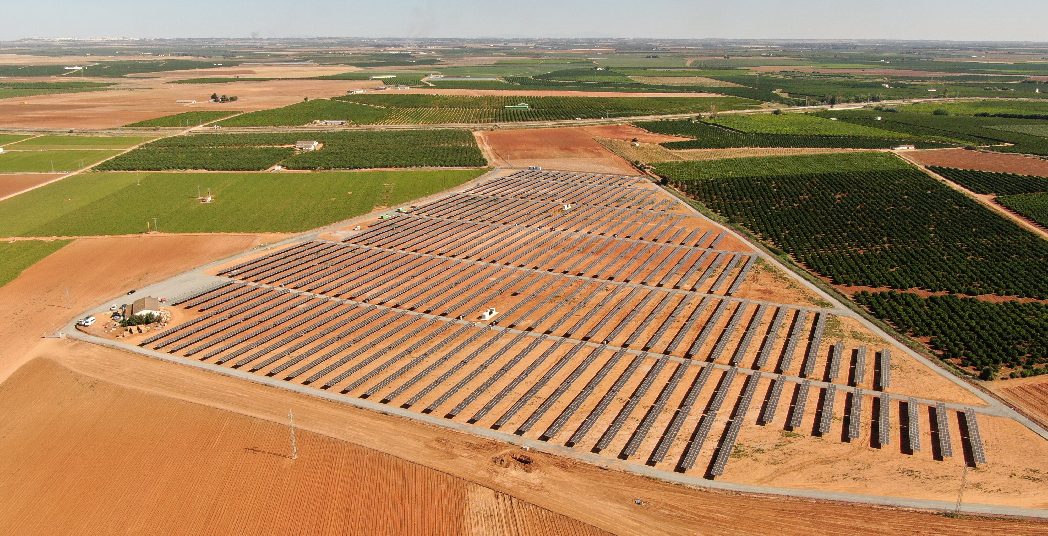HY4RES
Hybrid solutions for Renewable Energy Systems: achieving net-zero Atlantic area energy consumers & communities.
- PROGRAMME : Interreg Atlantic Area
- PRIORITY : Blue and Green Environment
- SPECIFIC OBJECTIVE : 2.4 - Promoting energy efficiency and reducing greenhouse gas emissions.
- PARTNERSHIP WITH CHAMBERS OF AGRICULTURE : AC3A
- LEAD PARTNER : Trinity College Dublin - Ireland
- DATES : 31/12/2023 – 30/11/2026
- TOTAL BUDGET : 3,20 M€ - 2,40 M€ ERDF

Why is the HY4RES project necessary?
The need for more sustainable energy systems is becoming more pressing every year. Providing safe and efficient energy from renewable sources is a major European challenge, whether in industry or on a smaller scale in local or more remote communities.
The HY4RES project will help improve the penetration rate of renewable energies in the energy system to meet the objectives set by the European Green Deal and Sustainable Development Goal 7 on clean and affordable energy.
What are the project's challenges?
One of the major challenges is the variable availability of renewable energy sources across the Atlantic Area. These energy sources need to be managed more efficiently using new technological and digital solutions, to enable their interoperability and maximise their use.
To meet these challenges, the HY4RES project will work on the development and demonstration of hybrid renewable energy systems combining wind, solar and hydropower, as well as on energy storage.
What actions are being implemented?
HY4RES relies on researchers, entreprises, policy makers and many other stakeholders, to test sustainable energy production systems in pilot sites, and to respond the energy needs of different sectors.
HY4RES partners will be working on:
1) Development of cost-effective small-scale solutions for hybrid electricity generation (wind/solar/hydro) and energy storage;
2) Creation of RE management software based on artificial intelligence, forecasting models following energy production and users energy demand;
3) Demonstration of hybrid renewable energy systems in 4 pilot sites: Ireland (aquaculture), Spain (agriculture and ports) and Portugal (community energy);
4) Systems sustainability assessment and formulation of policy advices;
5) Creation of a “Community of Practice” to involve and disseminate the project results among a wide network of stakeholders.
HY4RES pilot sites

Ireland – Aquaculture pilot site
Located in the north-west of Ireland, in County Donegal, the HY4RES aquaculture pilot site will implement a hybrid renewable energy system combining wind and hydro power. The implementation of a hybrid system to produce energy, and the use of management software, will help us maximise the energy produced in a fish processing plant.
Activities at this pilot site will focus on:
- Hybridising existing renewable energy production systems and increasing the export capacity of output energy;
- Development of hydropower technologies that respect biodiversity;
- Development of a software to design hybrid renewable energy systems, assessed at small hydropower installation scale.
Objectives:
- Demonstrate the potential for decarbonisation of the aquaculture sector using multiple energy sources (wind, solar, hydro);
- Measure and balance supply and demand from these variable output sources electricity, measure energy storage capacity and opportunities;
- Demonstrate the potential for optimising the management of available renewable energy sources, saving costs, and reducing emissions.
Spain – Port of Avilés – Port pilot site
Located in the port of Avilés, in the north of Spain, the port pilot site will implement a hybrid renewable energy system, combining solar, wind and hydropower at a micro-scale.
Activities at this pilot site will include the implementation of a modular system installation to test local smart grid, supplying power to the port’s small-scale demands: by harnessing water current within the port, and using energy control and management system including sensors and electronic control board.
Objectives:
- Reduce installation and maintenance costs;
- Ensure the hybrid system sustainability by optimising the use of renewable energy sources through intelligent management;
- Obtain a renewable and self-manageable energy production;
- Design a sustainable system with cost-effective components;
- Test operation and maintenance under real conditions, which can be implemented in several locations.
Portugal – Community energy
The pilot site at Castainheira de Pera and Marruge in Portugal concerns a community energy. The aim is to install a hybrid renewable energy system and implement software to manage the community’s energy needs. The system uses water from the small stream, solar energy captured on the surrounding slopes and wind energy.
Activities at Castainheira de Pera will include the rehabilitation of an old cap factory equipped with a water turbine, its adaptation to a museum and the use of management software. Activities at Marruge will include the rehabilitation of an old water mill and the use of management software.
Objectives:
- Energy self-sufficiency for the community;
- Increase attractiveness and competitiveness of the region;
- Rehabilitate old installations to create a hybrid renewable energy system.
Spain – Valle Inferior – Agriculture pilot plant (irrigation)
The Spanish agriculture pilot site is linked to the Valle Inferior irrigation system, within the Guadalquivir basin in Andalusia. The area benefits from existing solar panels that supply the country’s irrigation systems, and from the Peñaflor weir, which is used to irrigate the region.
The idea is to use solar energy and management tools in existing installations and implement a hybrid renewable energy system on a small irrigation water storage pond using floating solar panels. Activities at this pilot site will include the development of design software to determine the ideal sizing of components; run and environmental, economic and energy analysis, and cost-benefit analysis.
Objectives:
- Avoid the use of agricultural land for solar energy production, and replace the more polluting energy source usually used (diesel generators);
- Find the best way to manage an irrigation system to maximise the use of renewable energy, reduce main grid consumption, costs and carbon emissions;
- Reduce evaporation losses from the pond, reduce algae content;
- Improve solar panels performance using lessons learned from the hybrid operation of solar and hydro energy.
Deliverables
- Technological and digital innovations: fish-friendly turbine; hybrid renewable energy system design software; renewable energy management software components and integrated software tool;
- 4 demonstration pilot sites of hybrid renewable energy systems (with virtual tours available on the HY4RES website);
- 5 events to co-develop technological innovations with stakeholders;
- Reports on ecological, social and economic impact assessments and on the sustainability of HY4RES technologies;
- Roadmap for the development of HY4RES technologies, opportunity matrix and information note for economic and policy stakeholders.
Project results will be presented through publications, scientific articles, webinars and conferences during the course of the project.
HY4RES is 75% funded by the INTERREG Espace Atlantique programme.
Who is involved in the project?
HY4RES involves 9 partners from 4 Atlantic Area countries: Ireland, Spain, Portugal and France, working in the fields of renewable energy, agriculture, aquaculture and ports sector.

- Related news
The “Tourbeux” on their way to Galway for the Mapathon on Peatlands and Policies
- Projets AC3A
Lorem ipsum dolor sit amet, consectetur adipiscing elit. Ut elit tellus, luctus nec ullamcorper mattis, pulvinar dapibus leo.

